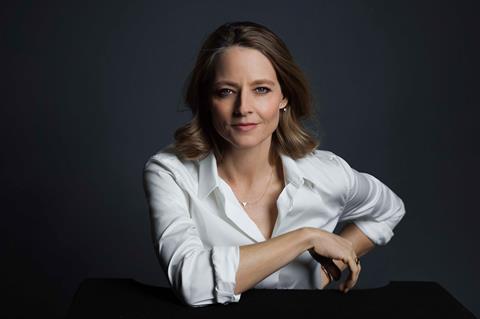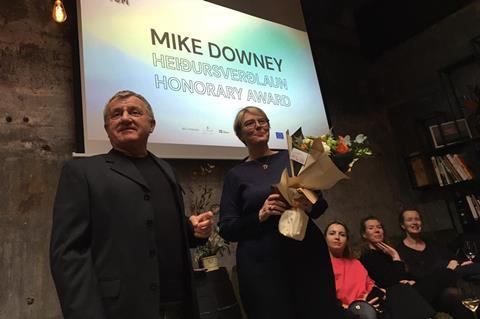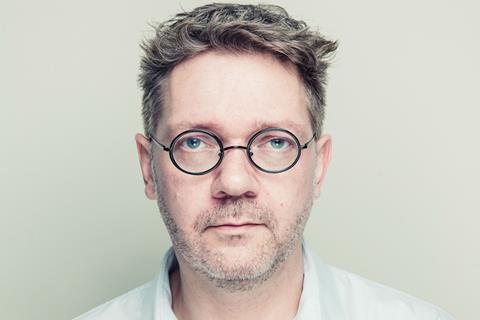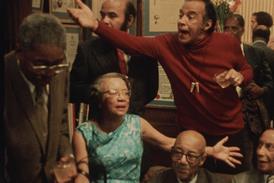
Iceland’s ninth Stockfish Film Festival got a high-profile boost with Jodie Foster participating in the Reykjavik festival’s panel discussion about women’s progress in the film industry.
Foster, the US actress, producer and director, is in Iceland shooting the fourth season of True Detective, and she joined producer Marianne Slot and actress Halldóra Geirharðsdóttir in the discussion, led by the new artistic director of Stockfish, Lamb producer Hrönn Kristinsdóttir. Kristinsdóttir started the panel started by stating, “In year 2000 a study showed that about 13% of films were directed by women. Now 22 years later we are at about 22-25%, that means an increase of 0.5 % per year. This process is far too slow.“
Foster, who has been spotted several times at the arthouse cinema Bio Paradis during her months shooting in Iceland since autumn 2022, said on the panel: “I have seen a shift from when I was younger, especially about male writers when approaching the idea of creating a female character, the motivations and roles offered by the scripts have changed, but we are not all the way there.”
Stockfish, a non-profit event, is organised by the filmmaking guilds of Iceland, was under new leadership this year with Kristinsdóttir and managing director Carolina Salas. The event ran March 23-April 2.
Ireland-born producer Mike Downey received Stockfish’s inaugural outstanding contribution to the industry award. Downey, producer and chairman of the European Film Academy, has a long history of collaborating with Iceland including on Reykjavik Whale Watching Massacre, Eleven Men Out, Niceland, Cold Light and Falcons.

At Stockfish, he presented The Rise and Fall of Comrade Zylo, directed by Fatmir Koci, which Downey co-wrote. Downey’s other recent credits include The Ghost Of Richard Harris and he will soon shoot Agnieszka Holland’s Franz Kafka biopic. He is also one of the co-founders of the International Coalition for Filmmakers at Risk.
He said: “Stockfish is a fabulous festival, and Iceland is home to some of the best film makers in Europe. There’s only one thing better than getting an award from the audience and that is an award from one’s peers. Having made a dozen films in Iceland or with Icelandic talent, I can really say that I am doubly honoured.”
Busy works in progress
Industry activity at Stockfish also included a masterclass with Tar DoP Florian Hoffmeister; a Slovakia focus; and a case study of Lamb featuring producers Sara Nassim and Poland’s Klaudia Smieja.
The works-in-progress session teased new Icelandic documentaries, fiction features and TV series. Some of the projects presented include Helena Stefánsdóttir’s Natatorium, sold by Level K; and Ninna Pálmadóttir’s drama Solitude, from a script by Rúnar Rúnarsson, sold by The Party Film Sales; Yrsa Roca Fannberg’s new documentary The Ground Beneath Our Feet; Ari Alexander Ergis Magnússon’s drama Epilogue, produced by Fridrik Thór Fridriksson; and TV series As Long as We Live created by actress Anita Briem and sold by Eccho Rights and Tinna Hrafnsdóttir’s Descendants, a Belgian co-production sold by Red Arrow.
Other industry events included Icelandic filmmaker Benedikt Erlingsson, director of Of Horses And Men and the eco-themed A Woman At War, guiding industry guests on a tour of Icelandic Film Forest. Stockfish will plant trees in the spring at the forest to offset the carbon footprint of the festival (including guests’ flights).
The festival’s only competition is Shortfish, is for Icelandic shorts films, with winners including: Felt Cute by Anna Karin Laurusdottir (narrative); Asgeir-Snowblind by Erlendur Sveinsson (creative music video); Story of a Blue Girl by Alda Aegisdottir (experimental); and Keep Fucking Going by Marie Lydie Bierne (documentary).
New Icelandic Film Centre head says “greatest enemy is stagnation”

The Icelandic industry was keen to hear the first public talk from Gisli Snaer, the new head of the Icelandic Film Centre, who officially takes up his post this week. Snaer, who had been director of the London Film School, noted that before he unveils any plans for the future of the Icelandic Film Centre, he plans on listening and learning.
“A vision like that is so influential and significant on the lives of the filmmakers in Iceland, that it does require their participation in coming together and sitting down with us and looking at the past 20 years, acknowledging what has been really successful, and also what we can do better. For any kind of institution, the greatest enemy is stagnation and compliance and just being happy with what you have and where you are. It’s a terrific time for me to come in because so much has been built.”
He added: “Just changing for change’s sake is no good. What you want to avoid is to make the institute dysfunctional. You want to actually streamline it. It’s a service institute to serve the people that actually are making the art.”
Snaer added that in dealing with public money, “you are servicing the whole nation, not only the filmmakers. Every day we should be grateful for that and respectful for that. There is a lot of frustration working in a highly regulated area, but there’s a reason for it because you need to be accountable.”
He said he wanted the Centre’s work to reflect the changing world of the film industry. “The old financial model of pre-sales is collapsing. We all know the tremendous change in the production of TV series. Our challenge to participate and assist and help for our industry to adapt to that. I’m not saying that people haven’t done that already, I’m just saying that the institution is indeed to facilitate and help and develop and grow. The change in the market is that you no longer have the medium-budget or low-budget feature film, it’s a nightmare to finance that, not necessarily because the money isn’t there, but because the screens are no longer there, so you don’t get it screened.”
He also noted Iceland’s huge success in production services of big Hollywood films (the rebate is now available up to 35% for larger productions, one reason True Detective came to shoot in the country). “We have to indeed assist and help and manage these [big productions], it’s an ecosystem, one can really not exist without the other. We have a tremendous amount of money coming into the country and contributing to the GDP, but also we have the training ground for an industry. This is really important, if you are only working on one film every 10 years, your skills are not comparable to someone who is actually working on three or four big projects per year, so this is contributing greatly to our industry as well.”

























No comments yet